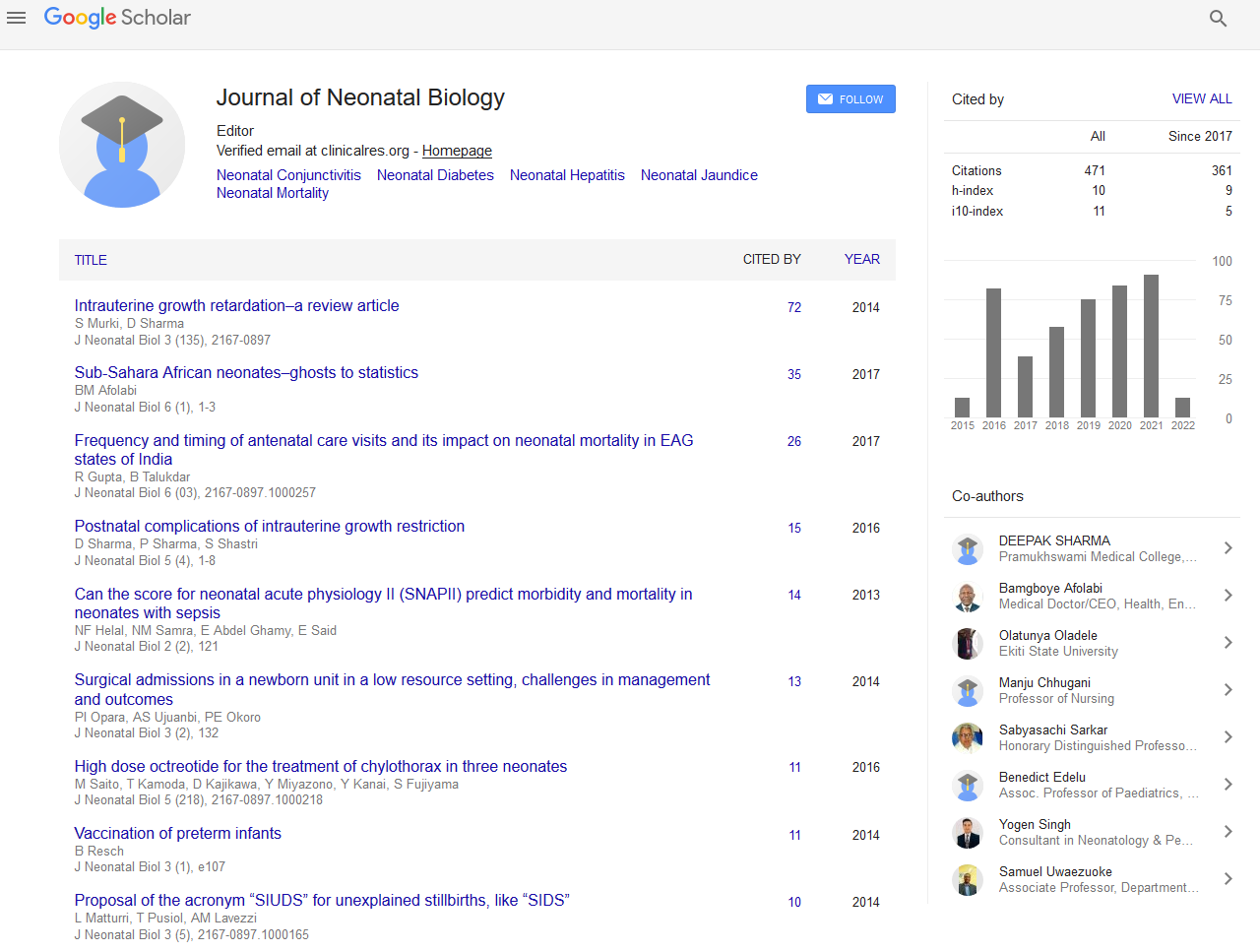PMC/PubMed Indexed Articles
Indexed In
- Genamics JournalSeek
- RefSeek
- Hamdard University
- EBSCO A-Z
- OCLC- WorldCat
- Publons
- Geneva Foundation for Medical Education and Research
- Euro Pub
- Google Scholar
Useful Links
Share This Page
Journal Flyer

Open Access Journals
- Agri and Aquaculture
- Biochemistry
- Bioinformatics & Systems Biology
- Business & Management
- Chemistry
- Clinical Sciences
- Engineering
- Food & Nutrition
- General Science
- Genetics & Molecular Biology
- Immunology & Microbiology
- Medical Sciences
- Neuroscience & Psychology
- Nursing & Health Care
- Pharmaceutical Sciences
Understanding uncommon diseases in neonates: Results of a multicenter collaborative of childrens hospitals NICUs
9th International Conference on Neonatology and Pediatric Neurology
November 28-30, 2016 Valencia, Spain
Jacquelyn R Evans
Children�??s Hospital of Philadelphia-University of Pennsylvania, USA
Scientific Tracks Abstracts: J Neonatal Biol
Abstract:
Excellent, longitudinal, worldwide benchmarking data have previously been available for infants cared for primarily in NICUs with delivery services. These databases primarily focus on preterm infants and their relatively small number of common associated morbidities, many of which can be used as outcome measures. Infant patient population that requires quaternary NICU care often differs substantially from those previously well characterized. Launched in 2010, and with 32 participating sites in Canada and the US, The Children�??s Hospitals Neonatal Database (CHND) was developed to allow quality benchmarking for infants with uncommon neonatal disease. In the CHND, the majority of patients are born >37 weeks�?? gestation; there is a high prevalence of rare to uncommon diagnoses and surgical care is remarkably frequent. In addition, the population of preterm infants in the CHND differs from most systematically studied preterm populations because the timing of referral of preterm infants to these quaternary NICUs is usually well after birth, and frequently after a significant proportion has acquired severe prematurity-associated morbidities, which indeed are often existing at the time of or even the very reason for referral. Thus, these traditional outcome measures are inappropriate for benchmarking the care and outcomes in large regional NICUs and perhaps serve more appropriately as to highlight the severity of illness in the very preterm infants who were referred. However, the rarity of the diagnoses managed as well as the historical absence of a large, multicenter collaboration has precluded both the development of appropriate benchmarks for expected outcomes, as well as disease- or intervention-specific quality improvement efforts. Likely due to this lack of systematic multicenter data collection around these uncommon diseases, few standards of care for these infants have existed and data on the inter-center variation in care, resource utilization and outcomes in the CHND sites have been striking. This presentation will highlight the findings of 6 years of quaternary NICU benchmarking in North America and the opportunities to improve care for infants with uncommon neonatal disease by collaborative efforts across many sites.
Biography :
Jacquelyn R Evans attended Dalhousie University School of Medicine and completed her Pediatric Residency at the University of Cincinnati and the University of Minnesota. Her Neonatology Fellowship was completed at the IWK Hospital for Children and the Grace Maternity Hospital, Halifax, Canada. She is the Associate Division Chief of Neonatology at The Children’s Hospital of Philadelphia and a Clinical Professor of Pediatrics at The Perelman School of Medicine, University of Pennsylvania. She is the Director of Patient Safety and Quality in Neonatology at CHOP and the CHOP Newborn Care Network. She is the Chair of the US News and World Report Best Children’s Hospitals Survey Neonatal Advisory Group and is the Chair of the Children’s Hospitals Neonatal Consortium.
Email: evans@email.chop.edu


